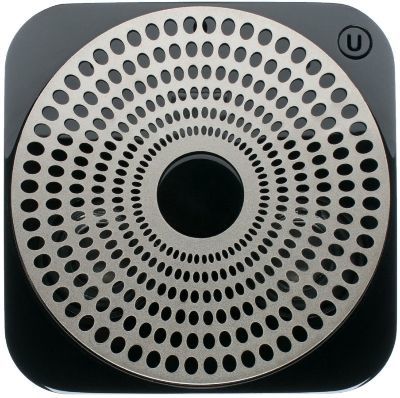The Ubi ubiquitous computer is here
Talk to your wall and your wall will talk back
February 10, 2014 by Amara D. Angelica
 Ubi (credit: Unified Computer Intelligence Corporation)
Ubi (credit: Unified Computer Intelligence Corporation)
In the next few days, I expect to receive my Ubi “ubiquitous computer.” I can’t wait.
According to the promo, I’ll be able to plug it into a power outlet and the WiFi-connected, voice-operated Ubi gadget will magically make the environment around it Internet-enabled.
Think an environment-aware version of Siri — with sensors that allow for remote monitoring of temperature, humidity, air pressure, and ambient light, for starters. Plus the usual Siri Internet information lookup stuff — but no cell phone (or computer) required.
The promo also says I should be able to use it to do Internet searches, send text messages and emails, ask questions, have it set timers and reminders, etc. — all hands-free. But this video will explain it better:
Open the iPod bay door, Hal
Unified Computer Intelligence Corporation CEO Leor Grebler told me the device will also be able to sense devices that are openly connected to the Internet (eventually, the Nest “learning” thermostat and smart smoke/CO2 alarms), “but we’re not controlling devices outright yet. We will add a way to talk to devices/Internet services as well as for them to talk back to the user.”
Here are the impressive specs: Android OS 4.1, 1.6 GHz Dual-Core ARM Cortex-A9 Processor, 1 GB RAM, 802.11 b/n/g Wifi Enabled (WPA and WPA2 encryption), stereo speakers and dual microphones, Bluetooth-capable, ambient light sensor, cloud-based speech recognition (Google/Android libraries), and natural language understanding.
Program it yourself
And you can program its user interface on a computer, or verbally on the Ubi, Grebler said.
What I really want is to access my Ubi remotely via my Google Glass, along with a webcam. Grebler told me that will be possible in the future.
“We’re slowly releasing apps on portal.theubi.com,” he said. “We have the first blossoms of an API that will essentially allow any Internet service, such as email, calendar, Twitter, Facebook, etc. ) to have its own voice and be interactive through the Ubi.”
Grebler also said Google Voice, Twilio, and other free (or cheap) phone services will be possible (but not Skype). Translation: throw out your home phone.
Project Ubi Odyssey
In that connection, Grebler said Unified Computer Intelligence Corporation will announce “Project Ubi Odyssey” today (Feb. 10). It will allow early adopters to develop connectivity with home automation and Internet services, and create novel human computer interactions.
(You can register for the program at www.theubi.com and selected candidates will be invited to participate in the program. The Beta Ubi cost is $299. The program is currently limited to 5,000 participants and to U.S. residents.)
I’ll let you know how Ubi works. Meanwhile, KurzweilAI would love to hear your ideas in the comments below orcontact us directly.
Amara D. Angelica is Editor of KurzweilAI
http://www.kurzweilai.net/ubi-ubiqui...14cd-282017473
Talk to your wall and your wall will talk back
February 10, 2014 by Amara D. Angelica
[+]
 Ubi (credit: Unified Computer Intelligence Corporation)
Ubi (credit: Unified Computer Intelligence Corporation)In the next few days, I expect to receive my Ubi “ubiquitous computer.” I can’t wait.
According to the promo, I’ll be able to plug it into a power outlet and the WiFi-connected, voice-operated Ubi gadget will magically make the environment around it Internet-enabled.
Think an environment-aware version of Siri — with sensors that allow for remote monitoring of temperature, humidity, air pressure, and ambient light, for starters. Plus the usual Siri Internet information lookup stuff — but no cell phone (or computer) required.
The promo also says I should be able to use it to do Internet searches, send text messages and emails, ask questions, have it set timers and reminders, etc. — all hands-free. But this video will explain it better:
Open the iPod bay door, Hal
Unified Computer Intelligence Corporation CEO Leor Grebler told me the device will also be able to sense devices that are openly connected to the Internet (eventually, the Nest “learning” thermostat and smart smoke/CO2 alarms), “but we’re not controlling devices outright yet. We will add a way to talk to devices/Internet services as well as for them to talk back to the user.”
Here are the impressive specs: Android OS 4.1, 1.6 GHz Dual-Core ARM Cortex-A9 Processor, 1 GB RAM, 802.11 b/n/g Wifi Enabled (WPA and WPA2 encryption), stereo speakers and dual microphones, Bluetooth-capable, ambient light sensor, cloud-based speech recognition (Google/Android libraries), and natural language understanding.
Program it yourself
And you can program its user interface on a computer, or verbally on the Ubi, Grebler said.
What I really want is to access my Ubi remotely via my Google Glass, along with a webcam. Grebler told me that will be possible in the future.
“We’re slowly releasing apps on portal.theubi.com,” he said. “We have the first blossoms of an API that will essentially allow any Internet service, such as email, calendar, Twitter, Facebook, etc. ) to have its own voice and be interactive through the Ubi.”
Grebler also said Google Voice, Twilio, and other free (or cheap) phone services will be possible (but not Skype). Translation: throw out your home phone.
Project Ubi Odyssey
In that connection, Grebler said Unified Computer Intelligence Corporation will announce “Project Ubi Odyssey” today (Feb. 10). It will allow early adopters to develop connectivity with home automation and Internet services, and create novel human computer interactions.
(You can register for the program at www.theubi.com and selected candidates will be invited to participate in the program. The Beta Ubi cost is $299. The program is currently limited to 5,000 participants and to U.S. residents.)
I’ll let you know how Ubi works. Meanwhile, KurzweilAI would love to hear your ideas in the comments below orcontact us directly.
Amara D. Angelica is Editor of KurzweilAI
http://www.kurzweilai.net/ubi-ubiqui...14cd-282017473
Comment